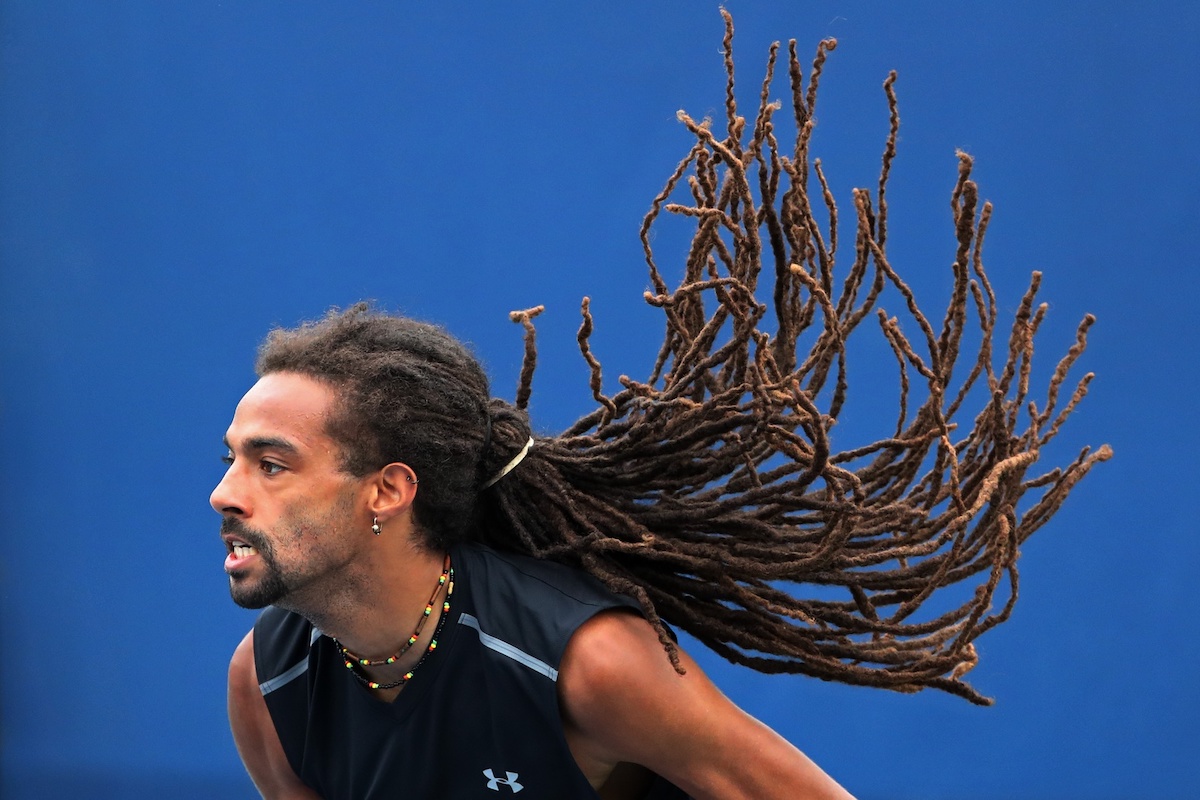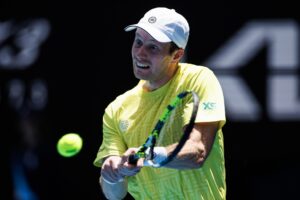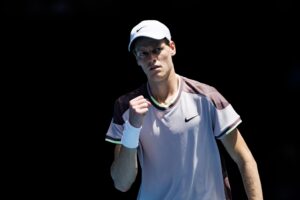Dustin Brown sat down with Last Word on Tennis in Houston to discuss his career including the transition from hard to clay courts and the difficult travel involved, his move to full-time doubles, recent transition back to playing under the Jamaican flag, and his awareness of the abuse tennis players receive on social media. At 38 years-old Brown is at the tail end of an impressive career that saw plenty of success in both singles and doubles. He produced plenty of highlights over his career with his trick shots and incredible upset Rafael Nadal at Wimbledon 2015. Brown spoke on a variety of topics starting with playing his first match on clay in 2023 and having only a day to prepare due to travel. He gave insight into playing exclusively doubles and preparing to play with Frances Tiafoe for the first time since 2018. Brown gave insight into why he recently decided to play for Jamaica again and wrapped up with a call to action for tennis and social media to do more to prevent the abuse players receive after losses.
The Transition from Hard to Clay and His Comfort on Clay Courts
He began by discussing the transition from hard to clay courts and the difficulty of tennis schedules, as he had arrived in Houston just one day before his match. He made the doubles final in the Lille Challenger event which was played on Saturday, just three days before he was scheduled to play in Houston.
“It’s my first clay match I played. On Saturday [I played finals] in Lille on hardcourt, so we’ll see how it goes. It was obviously shorter than I would have wanted it but you know, playing finals last week, would have normally been here a day earlier. Had a little bit of an issue with my flight on Sunday so ended up not flying Sunday, had to fly Monday. Got in yesterday afternoon which was obviously very late. But, if you play finals in the tournament before, that’s how it is, and you know the possibility would be there.”
Brown touched on how challenging tennis can be not knowing how far you will go in an event and how that will affect future matches. It was certainly a good problem to have but it likely affected his preparation for what would end up being a first-round loss in Houston. Brown also discussed why his game is well-suited for clay, though grass is his favorite.
“On clay, I just have a little more time. I can generate more power and have more variation of the drop shot and stuff with all the stuff that doesn’t work as well on the hard courts. I have generally played actually over my career and even also lately a lot better on clay. I think the grass is getting a lot slower. Everything’s kind of been the same pace and I think on clay, I just have a little bit more time. I can, you know, generate more power and have more variation of the drop shot and stuff with all the stuff that doesn’t work as well on the hardcourts.”
Embed from Getty Images
Moving to Full-time Doubles and Playing with Frances Tiafoe
On the topic of transitions, Brown gave some insight into how his approach has changed now that he exclusively plays doubles. It has been around two years since he made the switch and it has been positive for him. He made seven challenger finals in 2022 and won four of them. He spoke about the areas of his game he has improved with the switch and how that has helped his game.
“Obviously you train, a little different. With my type of game obviously, I used to volley a lot, but I realized that we’ve been returning a lot better obviously because we’re returning more. It’s a little bit more specific. As I’m only returning normally on one side. Been playing normally on the ad side most of the time. That’s what you focus on when you’re returning and only returning on that side. So that’s been getting a lot better and generally, I’ve only played singles in [exhibition leagues in] Germany in Bundesliga last year. And realized in the game that, I’m returning a lot better and volleying because it’s more volleys now than in singles.”
Brown played doubles in Houston with Frances Tiafoe whom he had only partnered with twice before, both in prior Houston events. They are friends off the court and played well both times, making the semifinals in 2018 and the final in 2017. Tiafoe is primarily a singles player creating an interesting dynamic partnering with a doubles specialist in Brown. Brown is familiar with the situation because he played a lot of doubles earlier in his career when his focus was on singles. He was not concerned about the dynamic and that was just part of playing professional tennis.
“I don’t worry about it too much. I’ve been doing that all my life playing single then doubles and a lot of guys I played with were only playing doubles and now it’s the other way around. But, I mean, everyone’s a professional. Everyone wants to go out there and win. So obviously his main focus is to play singles. I’m happy that he agreed to play doubles with me here. So, yeah, it’s a good chance we play well together, we played finals here before and semi-finals and have beaten good teams. let him prepare and do what he needs to do for singles, then try and go out there and give it a good team effort tonight.”
Embed from Getty Images
Trick Shots and Crowd Support
Brown’s trick shot abilities are well-known from diving volleys and tweeners all over the court to behind-the-back shots that make him a highlight for fans to watch. There are numerous highlight videos of his abilities with crowds loving the entertainment he provides. He talked about the crowd support from these and how getting the crowd behind him was more of an unintended consequence rather than a goal of hitting those trick shots.
“I play the way I play and I’m out there to try and win my match and do well, and that’s my tennis. If it’s nice and the people like it, then that’s a good thing. It’s nice to have the crowd behind you, but it’s not like I’m going out there and doing it specifically for a reason, that’s how I play. That’s my game. And over the years, I’ve learned, singles are double regardless, I need to go out there and play my game, that’s when I’m the most dangerous, and then obviously, if the crowd gets behind you, then it’s even better. Especially when you’re playing someone like Isner and especially here in the States” (in reference to his 2014 Houston win over Isner).
Embed from Getty Images
Recent Change in Nationality from German back to Jamaican
Brown has dual citizenship between Germany and Jamaica with each of his parents from those two countries. He was born in Germany but grew up in Jamaica and began his career under the Jamaican flag, switched to Germany from 2011-2022, then last year switched back to Jamaica.
“I just changed because I’ve had issues with the Jamaican federation and no support. And I didn’t switch to Germany because I was getting German support. I just switched because I have two passports. So instead of dealing with a federation that’s not supporting you and that’s still using your name and having an issue with the [Jamaican] federation at the time, I decided to play for Germany.”
Brown spoke on why he recently switched back to playing for Jamaica and how at this point in his career it was truly a personal and family decision on why he wanted to change nationalities’. He gave insight into those players with dual citizenship and some of the struggles of choosing one country over another.
“At the end of my career seeing that I’m playing singles anymore. I’ve always thought about and played with the idea that I wanted to switch back and play for Jamaica for the last few years and you never know what I’ll do after my career. It was also something that my parents, especially my dad, was very happy about that I was playing for Jamaica and he was proud. When I switched to Germany that was not he was not very happy, so it’s just one of the things I said, okay, at the end of career, I wanted to play for Jamaica. Again it has nothing to do with a federation, it’s a personal choice and that’s nothing to do with support, funds, or anything because I’m not getting anything from either federation.”
Embed from Getty Images
Abuse Tennis Players Experience After Losses on Social Media
Brown has been outspoken about the regular abuse he and many other players receive on social media after losses, often by gamblers upset at losing their bets. Be advised that some of the comments are offensive, racist, and abusive if looking them up, but Brown posts them uncensored to show what these players have to deal with. He gives his thoughts about these and what steps social media companies and the ATP can take to try and stop this.
“When you get messages like that, my wife and family are getting messages like that, it’s just not nice and I think a lot of things could be done more by the ATP, by the social media platforms ages ago. We spoke to the ATP [members] that were in contact with the platforms and gave certain solutions. Other websites like Uber you take a credit card you verify but then you do as many ghost accounts as you want and you can still have a fake account but if something happens someone can be held responsible. ID verification, I don’t know. I mean I’m not the tech guy. There’s a million things that are pretty simple and one thing I’ve just learned in my life if you want to do something, you do it, if you don’t want to do it, you find excuses.”
Brown rightfully seemed upset with the Tour’s lack of action with some of these and seemed to have had a lot of empty promises when discussing them. He then spoke about how occasionally when it happens in other sports it will come to light in the media but never stay as a major story. Tennis players have a uniquely difficult challenge in this because there is only one winner every week so most players deal with losses and everything that comes with that on a weekly basis.
“That’s pretty much where I’m at because it always flares back up during the World Cup when the British players miss penalties, it was very extreme but it was in the media, it was on TV, people were seeing it and people complained about it for a week and then it went away.
The sad thing is [it affects] all of us and it doesn’t make a difference if you’re white, black, what country you’re from, male, female, we deal with it on a weekly basis. So, sometimes the comments are worse. I do my social media myself, so I think I’m pretty thick-skinned, but I couldn’t think having a kid and a kid playing on a tour and having to deal with this type of stuff. It would be great if something could be done, I think something can be done, but the question is, if it will be done or not.”
Main Photo Credit: Geoff Burke-USA TODAY Sports






